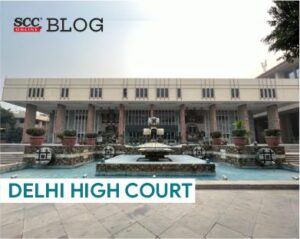Delhi High Court: In an appeal filed against the judgment dated 10-08-2021 rendered by the Single Judge while dealing with a challenge against the communication dated 12-02-2020 issued by Union of India rejected the request for grant of pension under the Swatantrata Sainik Samman Pension Scheme, 1980 based on the reason that a “widowed/divorced daughter” was not eligible for pension under the 1980 Scheme, a Division Bench of Rajiv Shakdher and Talwant Singh, JJ., upheld the impugned order wherein the Single Judge found the issue to be no longer res integra in view of the judgement delivered by a Division Bench of the Punjab and Haryana High Court in Khajani Devi v. Union of India, 2016 SCC OnLine P&H 15867 wherein the Court saw no good reason to differentiate between an “unmarried” daughter, who, admittedly, is an eligible beneficiary under the 1980 Scheme and a “divorced daughter”.
The Court noted that in 1969, “Ex-Andaman Political Prisoners Pension Scheme” was framed wherein the grant of pension was confined to those freedom fighters who, at the relevant time, had been incarcerated in the Cellular Jail, located in Port Blair (Andaman Islands) for at least five years. On 25th Anniversary of Independence, a central scheme for the grant of pension was introduced by the Government of India which brought within its ambit not only the freedom fighters but also their family members, in cases where the freedom fighter/martyr was no longer alive with an annual income ceiling of Rs.5000/- as an eligibility criterion for grant of pension.
Further, with the formulation of the 1980 Scheme, the benefit of pension was extended to all freedom fighters, the annual ceiling limit was removed, and the scheme included unmarried daughters as eligible dependents. However, a perusal of para 12 of the 1980 Scheme would show that unmarried daughters would not be able to draw pension once they get married or become independent.
The Court remarked that on reading the Scheme, 1980 and 2014 Guidelines together, it is clear that an unmarried daughter falls in the category of eligible dependents, and hence, is entitled to a pension upon the expiry of the freedom fighter subject to fulfillment of two conditions; first, the spouse or daughter should be unmarried and second, the spouse or daughter should not have an independent source of income.
The Court observed that the exclusion of a widow from the category of eligible dependents, once she remarries (which is not an exclusionary criterion in the case of a widower), is also not in consonance with para 3 of the 1980 Scheme, where no such caveat has been put in place. Therefore, if the 1980 Scheme is the ground norm for identifying eligible dependents, whether a widowed daughter falls within the ambit and scope of an unmarried daughter requires examination.
The Court remarked that the expression “unmarried” adverts to a person who is not married. It includes a woman who is single i.e., who was married but divorced and even a woman who is widowed. Thus, placing reliance on Khajani Devi case (supra), the Court observed that the expression “unmarried daughter” includes a divorced daughter, because if the intention was to honour those who laid down their lives or had suffered for the cause of the country, whether in uniform or otherwise, the expression eligible dependent should include a divorced daughter.
The Court held that there is no reason not to extend the benefit of the 1980 Scheme to a widowed/divorced daughter.
The Court further directed the UOI to ensure that the monetary benefit is extended to the legal representative of the deceased respondent , if otherwise there is no impediment under the 1980 Scheme, within the next six weeks.
[Union of India v. Kolli Uday Kumari, 2023 SCC OnLine Del 264, decided on 20-01-2023]
Advocates who appeared in this case :
Mr Harish Vaidyanathan Shankar, CGSC
Mr Mahesh Kumar Tiwari, Advocate
*Arunima Bose, Editorial Assistant has reported this brief.

